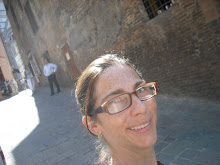I've been rereading Bk One of Rousseau's Emile today in order to finish up a conference proposal that's been sitting on my desk for a while, and I'm enjoying thinking about what Rousseau seems to mean by human nature. The conceit of Emile is that it is a narrative written by a "governor" (tutor and guardian), who happens to be named Jean-Jacques, about the education of his charge, a boy named Emile. Jean-Jacques' aim is to educate Emile for freedom. Rousseau's aim is, at least in part, to show us what human freedom is.
Rousseau famously opens the Social Contract with the quotation, "Man is born free, and everywhere he is in chains." With this thought in mind, one might say that the project of the Emile is to describe how one might help a freeborn child to avoid those chains. Whether there is hope for those of us who did not have such an education is a topic for another day.
Nature comes into the discussion because freedom is, for Rousseau, our original state; we will be free if we would be natural. That's not to say, though, that freedom is automatic. In fact Jean-Jacques, works overtime for decades in order to keep Emile "natural," since it is so easy for human beings to develop habits and inclinations that move us away from our nature.
Here are the four maxims Jean-Jacques offers as the foundation for Emile's education:
(1) Far from having superfluous strength, children do not even have enough for everything nature asks of them. One must, therefore, let them have the use of all the strength nature gives them--a strength they could not know how to abuse.
(2) One must aid them and supplement what is lacking to them, whether in intelligence or strength, in all that is connected with physical need.
(3) One must, in the help one gives them, limit oneself solely to the really useful, without granting anything to whim or to desire without reason; for whim, inasmuch as it does not come from nature, will not torment them if it has not been induced in them.
(4) One must study their language and their signs with care in order that, an an age at which they do not know how to dissimulate, one can distinguish in their desires what comes immediately from nature and what comes from opinion.
Given my recent reading of the Tao Te Ching, I cannot help but think about Rousseau's idea of nature and the freedom that follows from staying connected to one's nature in light of the Tao and Lao Tzu's cryptic advice for connecting with it. Look back at the quotation in
my previous post, and compare it to what Rousseau promises for Emile.
The spirit of these rules is to accord children more true freedom and less dominion, to let them do more by themselves and to exact less from others. Thus, accustomed early to limiting their desires to their strength, they will feel little the privation of what is not going to be in their power.
Freedom for Rousseau means freedom from tyrannical desires and unnatural habits; freedom to act in accord with one's desires and not one's whims. Freedom to know the difference between natural desire and whim (fantasie) , which is not at all an easy thing. Is this also the promise of the Tao?


0 Comments:
Post a Comment
<< Home